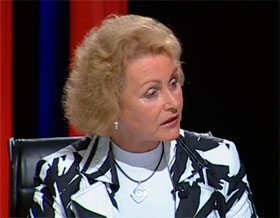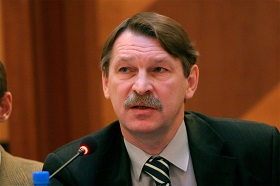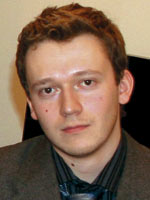Will Ukraine Become a NATO Member?
In
Login if you are already registered
(no votes) |
(0 votes) |
NATO and Kiev representatives are to meet in Brussels on 2–3 December 2014 for political consultations on Ukraine’s full membership in the North Atlantic Alliance. But how realistic is such a discussion in the light of the current internal and foreign policy challenges facing the Kiev authorities? What is the likelihood of a clear and final positive decision being made with regard to Ukraine’s membership of NATO as a result of the two-day consultations? Tatyana Parkhalina, Dmitry Danilov, and Andrey Baikov discuss the situation.
NATO and Kiev representatives are to meet in Brussels on 2–3 December 2014 for political consultations on Ukraine’s full membership in the North Atlantic Alliance. But how realistic is such a discussion in the light of the current internal and foreign policy challenges facing the Kiev authorities? What is the likelihood of a clear and final positive decision being made with regard to Ukraine’s membership of NATO as a result of the two-day consultations? Tatyana Parkhalina, Ph.D. in History, Deputy Director of the RAS Institute of Scientific Information for Social Sciences, Head of the Centre for Global and Regional Problems and RIAC expert; Dmitry Danilov, Ph.D. in Economics, Head of the European Security Department at the Russian Academy of Science’s Institute of Europe and RIAC expert; and Andrey Baikov, Ph.D. in Political Science (MGIMO) and Editor-in-Chief of the journal “International Trends” discuss the situation.
Could you comment on the upcoming meeting of NATO and Kiev representatives, which is tentatively scheduled for 2–3 December 2014?
Tatyana Parkhalina: Several conceptual and theoretical aspects should be mentioned. First, Article 10 of the Washington Treaty stipulates that the Alliance is committed to an open doors policy. If a state meets the Alliance’s norms and standards, and if there is agreement among the elites, then that country is eligible for membership. There have been several such cases in NATO’s history. The fact that some countries had to wait years until they were pronounced to be in compliance with these standards and norms is another matter (Albania waited nine years to be admitted). Second, one of the provisions in the 1975 Helsinki Final Act (Russia is a signatory as the successor to the USSR) says that any party that has signed the text of the Act has the right to choose the system of alliances that ensure its security. Third, the decision of the NATO Bucharest Summit of April 2008 devised a formula whereby Ukraine and Georgia would eventually join the Alliance. The formula is very vague and non-binding. Such a palliative decision met the need to find a compromise between pressure from the United States and reluctance on the part of Russia. There are, however, conceptual and theoretical considerations that do not rule out the possibility of membership for Ukraine, and indeed for any other country – including Russia.
Furthermore, in September 1995, NATO issued a multi-volume code of conduct that countries must comply with before they can be admitted into Alliance. First, the country must have no internal or external territorial disputes. Incidentally, at the time, applicant countries were supposed to have cooperative relations with Russia. It is not by chance that the Russian President’s press secretary said in mid-November 2014 that Russia needs a 100% guarantee of Ukraine’s non-accession to NATO. In conceptual and theoretical terms such a promise cannot be given because that would mean a departure from the principles of the Washington Treaty.
Inside NATO there is concern about a change of borders in Europe. I don’t think that NATO members are prepared at this juncture to invoke Article 5 of the Washington Treaty – the collective self-defence principle – in the case of Ukraine. That would mean that all the NATO countries would undertake to defend Ukraine if a third country attacked it. Clearly, the third country is Russia. I do not rule out that the issue of joining NATO was raised by the Ukrainian side in the hope of getting some sort of guarantees from the Euro-Atlantic partners. But I don’t think the forthcoming meeting will discuss real Ukraine membership of the Alliance.
Various scenarios will be discussed, including military options in view of the situation in southeastern Ukraine. I would like to add that we shouldn’t attach too much significance to the various conferences and meetings taking place in Ukraine, the Baltic countries, Poland and so on. We should take a more relaxed attitude to them.
What can we expect from the meeting of NATO and Kiev representatives in Brussels scheduled for 2–3 December 2014?
Dmitry Danilov: On the one hand, in the context of the crisis, Ukraine is considering all the options for strengthening its integration into Europe. On the other hand, it is seeking all-round assistance from the West, including in ensuring its national security. Ensuring Ukraine’s security is not confined to political safeguards and Western support, including in its relations with Russia.
At the initial stages of the crisis, Ukraine turned to NATO for help. The request was discussed at the Council of Defence Ministers. Thus, NATO and the West were revising relations, among other things, with Russia in parallel with decisions on assisting Ukraine in accordance with the Charter on a Distinctive Partnership between Ukraine and the North Atlantic Treaty Organization. It was decided to assist Ukraine in three main areas: 1) reform of the armed forces; 2) interaction and liaison between Ukraine and NATO; and 3) building up practical activities as part of joint exercises between Ukraine and NATO with the aim of enhancing combat readiness and possible interaction in combat situations.
This raised the question of whether Ukraine needed to revise its policy for interaction with NATO in light of earlier decisions that proclaimed Ukraine’s non-alignment. The decisions were passed under the previous leadership, during Viktor Yanukovych’s presidency. It is in this context that the current situation should be seen. NATO has practically suspended relations with Russia. The only remaining working channel is top-level political consultations at the NATO–Russia Council.
The Wales Summit of 2014 declared that Russia now represents one of the main challenges to NATO. Accordingly, NATO is already restructuring its activities in Europe, consolidating its defences, including strengthening its eastern borders by building up the operational presence of its forces. In this context, there have been vocal calls to revise Ukraine’s non-aligned status. I think this will be done. The present Ukrainian leadership is not hiding its desire to re-examine the issue. Back in September, the President of Ukraine signed a decree on strengthening Ukraine’s security under special conditions. One of its provisions was the need to turn to NATO in accordance with the Charter on a Distinctive Partnership between Ukraine and the North Atlantic Treaty Organization, calling for an immediate meeting of the Council and consultations on ensuring or bolstering Ukraine’s security and defence capability. The decree also launched a similar appeal to the governments of the United States and the United Kingdom for military assistance. Ukraine received classified directives in accordance with this decree. Under the document, efforts were to be made to develop the UkrOboronProm concern to broaden military-industrial and military-technical cooperation with NATO.
This indicates that Ukraine is pinning serious hopes on pursuing more vigorously its policy of comprehensively developing its interaction and partnership with NATO, which is in keeping with the Charter on a Distinctive Partnership, while at the same time considering NATO membership. These discussions are taking place against an adverse political background, where the West claims that the Minsk Accords are not working mainly through Russia’s fault. Russia should take serious steps to make the Minsk agreements work, de-escalate the crisis and keep up the process of political settlement.
Ukraine is thus putting the West in a delicate situation by raising the issue of stronger links with NATO. On the one hand, the member countries profess a readiness to cooperate. On the other, they are aware that, in current conditions, fresh steps towards greater cooperation with Ukraine would mean that NATO and Russia would be drawn into a military-political conflict.
Russia has made it clear that NATO membership for Ukraine, and indeed any other post-Soviet state, is absolutely unacceptable. NATO, as usual, counters that Russia has no say on such matters. On the other hand, politicians point out more and more often that Ukraine cannot be a member of NATO under the current conditions. The situation is unlikely to change any time soon. German Federal Minister for Foreign Affairs Frank-Walter Steinmeier said as much recently. This clearly marks out the boundaries for the Ukrainian leadership in raising the issue of NATO membership.
Moreover, NATO is well aware of the need to ensure the internal cohesion of its member countries without rocking it. This was one of the central tasks of the Wales Summit, which was called upon to ensure Trans-Atlantic bonds. The task was effectively solved. However, any provocative question that might bring about substantial differences among its members threatens to dilute NATO’s political unity at this critical period.
It is worth recalling the policies that Germany and France pursued on possible NATO membership for Ukraine and Georgia before the Bucharest NATO Summit. The outgoing Bush Administration did everything to consolidate the prospect of integrating these countries into NATO. Yet in spite of the unequivocal signal from Berlin and Paris that they would not back such a decision, the United States put the issue on the summit’s agenda and predictably failed to achieve the desired consensus. This became a major factor of internal erosion.
Today, the situation is still more serious and one can hardly expect NATO to repeat such political mistakes. In any case, the consultations will be devoted to specific areas of strengthening Ukraine–NATO cooperation in accordance with the decisions taken. We cannot rule out that NATO will signal to Ukraine that assistance does not automatically open up the prospect of membership. That would in any case deepen the political crisis both inside Ukraine and in the context of Russia–NATO and Russia–West relations.
Technically, in order to set such a goal, as Petro Poroshenko has said, a nationwide referendum is needed. The question then arises of how and on what territory the referendum would be held and what its legal consequences would be. If southeastern Ukraine does not take part in the referendum and its results are declared null and void, it would amount to Kiev giving up those territories. A referendum is impossible under current conditions. Besides, the alignments in the new Ukrainian Rada (Parliament) suggest that it would approve NATO accession by an overwhelming majority. For example, leader of the Civic Position party and former Minister of Defence in Yulia Tymoshenko’s government Anatoliy Hrytsenko has always been a staunch supporter not only of broader links with NATO, but also of Ukraine’s integration into NATO. He was behind the stepped-up efforts to integrate Ukraine into NATO from the second half of the 1990s.
The fact of the matter is that Petro Poroshenko is not independent enough and he will come under pressure on this issue. The bid to change the political line and declare Ukraine’s commitment to becoming a NATO member meets with major political and practical obstacles, above all from NATO, but also inside Ukraine. I don’t think the consultations will see a hands-on discussion of Ukraine’s integration into NATO.
Kiev goes to Brussels
Andrey Baikov: The upcoming meetings in Brussels between NATO and Ukraine are incapable of eliciting from observers any strong emotions such as anxiety, concern or guarded optimism (depending on the side you are on). Nor is there any intrigue behind the meeting. Its outcome is more or less clear and the negotiating strategies of both sides are well known.
What can we expect from the meeting and how real are Kiev’s chances of joining NATO?
Considering that the situation in Eastern Ukraine has taken another turn for the worse, Kiev has never been further away from becoming a member of the bloc. Judging from the latest statements of the head of state, the national elite takes a realistic view of these chances.
In a country that has de facto lost a big chunk of its territory as a result of the pre-emptive intervention of a militarily stronger power, the most advanced region is in turmoil and seeks to secede. Poroshenko’s peace initiatives can hardly be called successful. Nor can they be called consistent, which does not win for Kiev any supporters among the war-weary citizens of Donbass or burnish Poroshenko’s own reputation.
Talking about accession is unrealistic until the situation in the southeast is settled for one simple reason: effective (i.e. de facto controlled) borders of a sovereign Ukrainian state have not yet been determined. The former aspect is not just a formal obstacle to entry. Crimea as part of Russia will be a constant reminder to Ukraine and especially its Western partners of the presence of a great non-NATO power in the area of its basic geostrategic interests. The high priority of these interests was highlighted by Moscow’s lightning-swift reaction and the amount of political, diplomatic and other effort that went into the development of the new constituent entities of the federation. Nobody in the West has any illusions about Moscow’s stand over the Crimean issue.
Even if the southeastern problem is resolved on Kiev’s terms, Brussels is well aware that by letting Ukraine into its cosy home it would let in unbidden problems of latent separatism. Most importantly, they would get a real geopolitical rival in Russia, which would feel that its security interests have been wrongly infringed upon. In a situation of open antagonism with Russia, it makes no sense to talk about secure European safeguards, as they know only too well.
However, even under these conditions, consultations between Brussels and Kiev are normal. Above all for Ukraine. Poroshenko’s legitimacy arose from, and is sustained by, Western support. Of course, NATO membership is an uncertain distance away, but today the prospects of Ukraine’s armament, its negotiating stance in the gas dispute with Russia and the terms of massive international loans hinge on its “strategic” closeness to the European Union, the United States and NATO. Besides, in terms of reputation, pro-NATO rhetoric enables Kiev to disguise its client-state position (which is obvious at least to us) by creating a sense that Ukraine is within an inch of becoming an associated member of the European Union and NATO. We may recall its (unfulfilled) dreams of having the special status of an ally of the United States and NATO.
For NATO, relations with Ukraine are far more straightforward in terms of the goals set. By declaring that it shares the ideas and values of Euromaidan, Brussels seeks to boost the morale of Ukrainian society, which has sunk in the morass of social and economic crisis, to make it stick to its pro-Western and anti-Russian position and simultaneously put Russia off its aggressive intentions. The motives are as obvious as they are cynical. But the cynicism of Western policy has been the leitmotif of the Ukrainian situation over the past year and a half, a fact that would surprise no one in Russia.
Compiled by Maria Gurova, RIAC Program Manager
(no votes) |
(0 votes) |






